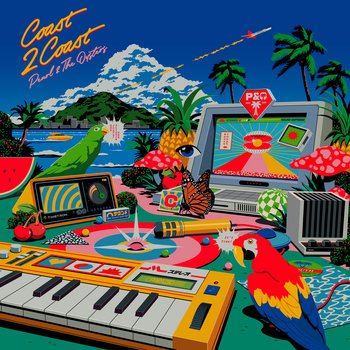by Zak Mercado (@ciaoguaglione)
On one hand Coast 2 Coast is the chilliest of hangs, a post-chillwave party. On the other hand, it confronts technology and existence through the lens of (or, in spite of) this party atmosphere. Maximalist and controlled, on this album, Pearl & The Oysters have created a fully formed concept and sense of self.
Risking appraising the past decade and a half of indie-adjacent music in a short review about a fantastic album, there is something to be said about the influence of chillwave, and vaporwave (or any -wave rabbit hole one may find themselves down on Youtube), on recent music. If anything, the aesthetic qualities of those loosely labelled sub-genres have seemed rather out of fashion over the past few years. However, some artists have, as do Pearl & The Oysters, continued the tradition of those torch bearers, but what torch were they bearing? It seems to be more clear that indie-pop adjacent artists are revisiting, rediscovering, or bringing back into fashion the music of Stereolab (see En Attendant Ana’s fantastic 2023 album). Also, there is perennial interest in Kraftwerk and Yellow Magic Orchestra. The music of those groups has clearly garnered appreciation over time. They are the forbears of making muzak not only interesting, but complex, and worth appreciating in the most cerebral of senses. Moreover, they, along with Pearl & The Oysters, transform muzak into something fun and pop-oriented.
Pearl & The Oysters perfectly capture and expand upon the sense of their forbears and their previous work. In one case, they get the ultimate stamp of approval with a Laetitia Sadier feature on “Read the Room.” The song is an absolute party. Heavy guitars on the verses and baroque harpsicord flourishes in the other sections, the lyrically repetitious tune is a best of all worlds indie song. Elsewhere, on “Paraiso,” the duo nod their hat to Haroumi Hosono and the Yellow Magic Band’s Paraiso. This is true of their album cover (with parrots and a coastal scene), as well as the instrumentation on that track. That song represents a signature mood of this album. “Paraiso” is being on one of the coasts the album speaks of, and being in the heat of a “paradise.” The song conveys the feeling of walking down the street on a hot day after having eaten more than enough. Deeper than this overheated lethargy, it’s the world of the album, a digital, electronic signal only kind of life, possibly dystopian.
That electronic-signal world theme is repeated throughout. On the opening track, one imagines the chirping synthesizers as the birds on the album cover. On “Konami,” the narrator’s relationship to a white noise machine is central to their existence. On “Loading Screen,” the being-toward-technology of existence involves staring at screens throughout life as we wait for them to load and present us with the information, images, and digital experiences we seek. “D’Ya Hear Me!” sublimely epitomizes these experiences: “don’t throw away this chance/this could be sweet romance… d’ya hear me?/can you see me?” As in Spike Jonze’s film Her, there are likely unanswerable questions in the age of entangled relationships with computer technology and human interaction: do we really see each other or hear each other over phones, over video chats? Are we slaves or in a relationship to this technology? Are its digital signal pings and buzzes the mini computers reaching out to humans, saying, “d’ya hear me?” Finally, on “Vicarious Journey,” as humans submerse themselves in technology, they become one with computers, experiencing what someone has coded in a proxy trip to a foreign video game land or another artificially created experience.
In the end, the album turns to existential philosophy. The final reference is to Nietzsche’s Joyful Science and the concept his character Zarathustra, elsewhere, explores—eternal return. In the face of repeating each moment repeatedly, could it truly be life-affirming to accept the current status quo relationship with computer technologies as happens in Her? Far from Brave New World, this album quite nearly suggests there is no dystopia (or utopia) in the human being-toward-technology. It just is and the party is happening no matter what. You can love this fate and join in the dance.

